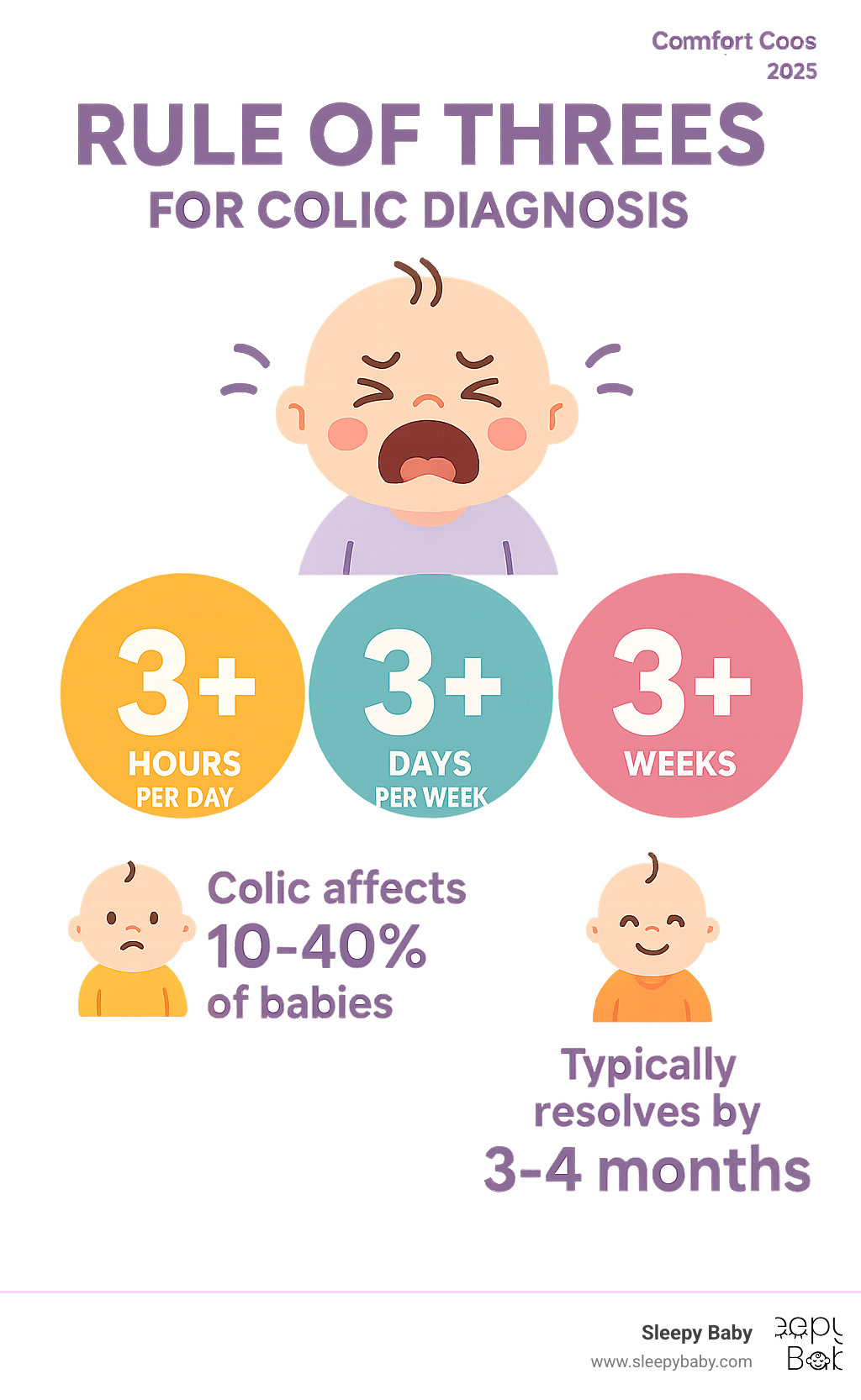
















Colicky describes a healthy, well-fed baby who cries frequently and without an obvious cause. For parents, it's one of the most challenging phases of early parenthood.
Quick Definition of Colicky:
Affecting 10-40% of babies worldwide, colicky episodes are a common experience. The crying starts suddenly and can last for hours, leaving parents feeling helpless. Unlike normal fussiness triggered by hunger or a dirty diaper, colicky crying seems to appear from nowhere and resist all attempts at comfort.
The good news is that colic is temporary and not a sign of a serious health problem. Your baby will outgrow this phase. You are not doing anything wrong, and it is not your fault.
I'm Gary Harutyunyan, a first-time father who struggled with my own colicky baby's sleep. I understand the exhaustion you're feeling. My journey through those sleepless nights led me to create solutions that have helped my family and countless others.

That inconsolable crying that starts like clockwork every evening can be heart-wrenching. If your otherwise healthy baby becomes distressed for hours for no apparent reason, you might be dealing with colic. This isn't just regular fussiness; it's intense, prolonged crying that can leave parents feeling overwhelmed.
For a deeper dive into identifying these patterns, check out our comprehensive guide: The Crying Game: Recognizing Colic Symptoms in Babies
Doctors often use Wessel's criteria, known as the "Rule of Threes," to identify colic. A baby might be colicky if they cry for three or more hours a day, for three or more days a week, for three or more consecutive weeks. This framework helps distinguish the consistent pattern of colic from normal newborn fussiness, reassuring parents that what they're experiencing is a recognized, temporary condition.
Colicky babies often show discomfort through their body language. Recognizing these physical signs can help you understand what your little one is going through.

During an episode, you may notice:
While all babies cry to communicate, colicky crying is distinct. Normal crying has a clear cause and solution (e.g., hunger is solved by feeding). Colic, however, is different in several ways:
Despite the distress, a colicky baby is healthy, eating well, and gaining weight. The crying is a challenging phase that will pass, not a sign of a medical emergency.
One of the most frustrating parts of colic is that its exact cause remains unknown, even to researchers. The good news is that fewer than 5% of colicky babies have an underlying medical condition. Colic is not your fault; it's likely a perfect storm of developmental factors.

While there's no single answer, several theories help explain what might be happening. For a deeper medical perspective, see Infantile Colic: Recognition and Treatment.
An immature gut is a prime suspect. A baby's digestive system is still learning to function, making it prone to gas and uncomfortable spasms. Babies swallow air while feeding and crying, and the resulting gas pain can be intense. An imbalanced gut microbiome (the community of bacteria in the gut) can also contribute to discomfort. Furthermore, feeding issues like overfeeding, underfeeding, or ineffective burping can worsen the problem by overwhelming the system or trapping air.
What your baby eats can sometimes be a trigger. Cow's milk protein sensitivity is a common culprit, affecting both formula-fed babies and breastfed babies if the mother consumes dairy. For breastfeeding moms, other foods like caffeine, chocolate, or gassy vegetables might also cause issues. If a food sensitivity is suspected, your pediatrician may suggest an elimination diet for you or a switch to a hydrolyzed protein formula for your baby. For more on this, research like Dietary modifications for infantile colic offers valuable insights.
Beyond the tummy, other factors may play a role:
When your baby is colicky, your only wish is for the crying to stop. The good news is that many proven techniques can bring relief, both for your baby and for you. Finding what works is often a process of trial and error, so having a toolbox of strategies is key.
For a comprehensive guide, check out: The Ultimate Guide to Soothing a Colicky Baby Without Losing Your Mind
Many effective techniques work by recreating the comfort of the womb. Dr. Harvey Karp's famous "5 S's" method is a great starting point:
Other helpful methods include a warm bath, a gentle tummy massage to release gas, and holding your baby upright during and after feeds to burp them thoroughly.
For more tips, read: The Easiest Way to Soothe a Colic Baby
Modern technology offers remarkable tools to help soothe a colicky baby when your arms need a rest.

Rhythmic tapping devices are a breakthrough, mimicking the gentle, consistent patting of a caregiver. This rhythmic sensation helps calm an overstimulated nervous system and can promote better sleep. Similarly, modern safety-rated white noise machines provide consistent, womb-like sound. Unlike some older models, these devices deliver sound at safe, low-decibel levels, and some are even designed to be placed on your baby's chest for maximum comfort.
At Sleepy Baby, our sleep aids combine rhythmic patting with safe white noise, providing hands-free soothing that gives both baby and parents much-needed relief.
Caring for a colicky baby is emotionally and physically draining. Your well-being is not selfish—it's essential.
In the middle of a colicky night, it can feel endless. But the most important thing to remember is that colic is a temporary phase that your baby will outgrow. Understanding the typical timeline and knowing when to see a doctor can provide peace of mind.
For more on when to expect relief, read: When Does Colic Go Away
Colic is a self-limiting condition tied to your baby's development. The timeline generally looks like this:
Your baby is simply maturing, and their nervous system is learning to regulate itself.
While colic is harmless, rule out other medical issues. Trust your instincts and call your pediatrician if excessive crying is accompanied by any of these red flag symptoms:
Your doctor can perform an exam to rule out conditions like acid reflux, allergies, or infections that can mimic colic. For more medical information, see Colic Differential Diagnoses.
Parents often worry about the long-term impact of colic, but the research is reassuring. Colic causes no long-term harm to your baby. They develop just as well as their non-colicky peers.
Let's bust some common myths:
While babies are unaffected long-term, the stress of colic can impact parents, increasing the risk of postpartum depression and caregiver burnout. This is why parental self-care is so important. In moments of extreme stress, if you ever feel you might lose control, place your baby safely in their crib, walk away, and call for help. Protecting your baby and yourself is the priority.
When you're awake at 2 AM with a crying baby, questions are inevitable. Here are clear, evidence-based answers to some of the most common concerns from parents of colicky babies.
It's possible. Some babies are sensitive to foods in their mother's diet. A pediatrician might suggest an elimination diet, where you remove common allergens like dairy, soy, eggs, wheat, and nuts one at a time for 1-2 weeks to see if it helps. For formula-fed babies, a hypoallergenic formula may be recommended. Always consult your pediatrician before making significant dietary changes to ensure you and your baby maintain proper nutrition.
Many over-the-counter remedies are available, but their effectiveness varies.
Always talk to your pediatrician before giving your baby any drops, supplements, or remedies.
For more on these remedies, see: Colic Drops: Separating Fact from Fiction
This is a common fear, but the answer is a resounding no. Extensive research has found no correlation between having colic as an infant and having a difficult temperament or behavioral problems later in life. Colic is a temporary developmental phase, not a preview of your child's personality. This challenging period will pass, and your baby's future is just as bright as any other's.
If you're in the thick of colicky nights, remember this: you are doing a great job, even when it feels like nothing is working. Having a colicky baby is one of the most exhausting challenges of new parenthood, but this storm will pass.
Here are the key takeaways:
Modern tools can provide significant relief. Rhythmic tapping devices, like our Sleepy Baby products, mimic your comforting touch, while safety-rated white noise machines create a calming, womb-like environment. These aids can give you a much-needed break while still soothing your colicky baby.
The cries that exhaust you today will soon be replaced by giggles that melt your heart. Your colicky baby will sleep peacefully, and so will you.
Stay strong and remember that we're here to help you find calm in the chaos.
For more information on effective soothing devices, explore: Gadgets to the Rescue: Top Colic Relief Devices for Babies